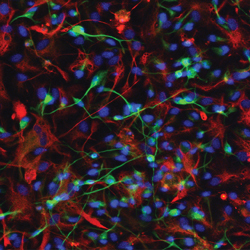Uterine cancer is the fourth most common cancer among women, and the most common gynecological cancer. Researchers at the University of Iowa are using high-performance computing (HPC) to investigate how a tumor develops in normal uterine epithelium.
The majority of cancer research presumes that every cell in a tumor is driven by the same genetic alterations and follows same pathway to malignancy. Dr. Donghai Dai, associate professor of obstetrics and gynecology in the Carver College of Medicine, doesn’t think that’s the case. He believes the billions of cells that make up a tumor may each have their unique mutations that cause them to deviate from normal cell behavior. So, Dai and his team are taking a single-cell approach to studying the development of tumors. With complex mathematical models and the Helium computing cluster, administered by Information Technology Services, they can run simulations on millions of representative uterine cells each day. The researchers determine the fate of the cells through incorporation of the combined effect of numerous random mutations and varying hormonal stimulations. Click on the image or title to learn more.



 Your new post is loading...
Your new post is loading...

















